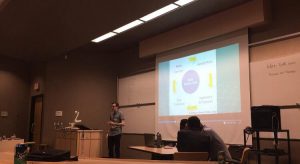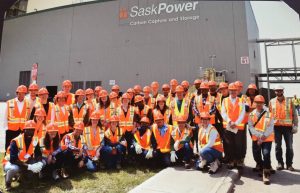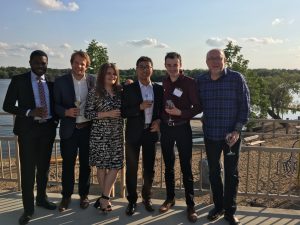Article written by Ben Callow
I was very fortunate to be selected for the 2017 IEAGHG Carbon Capture and Storage (CCS) Summer School, hosted by University of Regina, Saskatchewan, Canada. The 11th Summer School was a week-long intensive course covering all aspects of CCS; ranging from the technical challenges of capture, transport and storage methods to discussions of policy, economic feasibility and public perspective. The CCS Summer School community comprised of 35 students of varied nationalities, experiences and technical backgrounds, along with experts from industry and academia which provided a unique networking opportunity.
Whilst my research is on the study of chimney structures for improved CO2 storage site characterisation (STEM-CCS, CHIMNEY), the week provided an excellent opportunity to step away from my focused area of research and appreciate the role it plays in the broader context of CCS. It was inspiring to work alongside and learn from like-minded Early Career Researchers (ECRs), who shared the same passion for CCS and mitigation of anthropogenic CO2 emissions.
During the week we were also required to undertake a group research project. My team researched the role CO2 Enhanced Oil Recovery (CO2-EOR) plays in the CCS chain. It was intriguing to get multiple perspectives on CCS from experts in industry (Simon O’Brien – Shell, Mike Monea – SaskPower), academia (Katherine Romanak – The University of Texas at Austin), public communication (Norm Sacuta – PTRC) and from a policy perspective (Tim Dixon – IEAGHG).
Presenting during the group project on the role of CO2-EOR in CCS to a room of experts and fellow Early Career Researchers (ECRs)
A visit to SaskPower CCS plant and Boundary Dam gave me an appreciation of the technical complexity and scale of operation required to convert a coal fire power plant into a plant capable of CO2 capture and storage.
A day visit to the SaskPower Boundary Dam Carbon Capture and Storage facility
The key message I took away from the summer school was that the CCS technology, whilst improving in efficiency and understanding, is in place. What is preventing further full-scale projects is the economic feasibility and effective policy. Clear public communication is also an important factor that cannot be overlooked.
I now look forward to sharing the knowledge I have gained from the summer school. It was an invaluable and unique learning experience. I thank the IEAGHG, SaskPower, University of Regina, UKCCSRC and University of Southampton for the fantastic opportunity, I am sincerely grateful.
The team at award night by Wascana Lake, it provided an opportunity to reflect on the week.
Link to Ben Callow’s personal page



